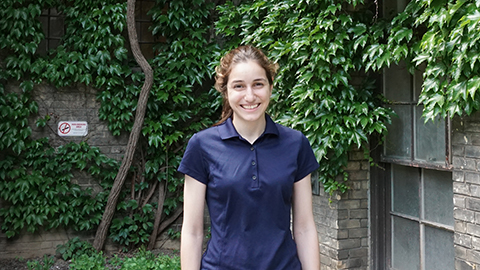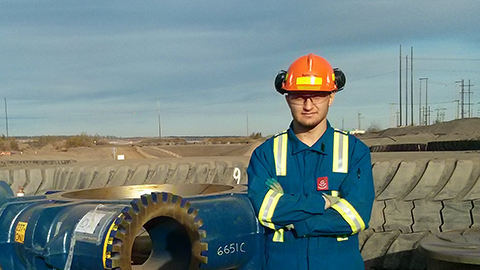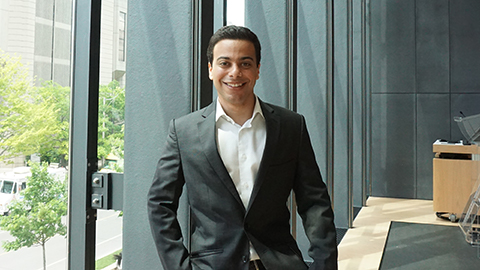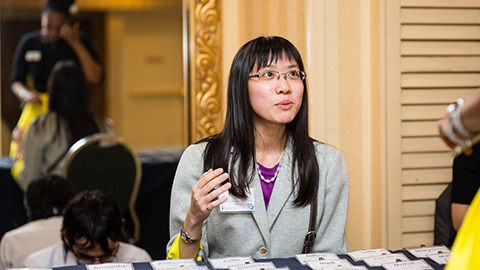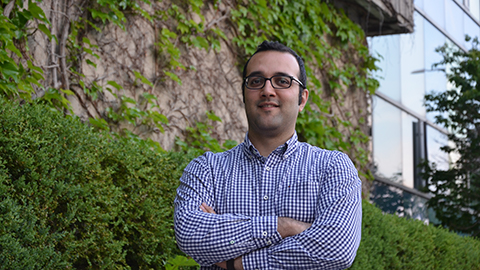June 7, 2016 — At the Department of Mechanical & Industrial Engineering (MIE), students graduate with a robust engineering know-how that sets them apart. On June 8, MIE is proud to graduate a new class of engineers who aim to change the world. Here are just seven amazing grads to watch.
Lauren Howe (BASc IndE 1T6)
What are some of your academic and extra-curricular highlights from your time at MIE?
In the final year capstone design course, our engineering team worked with Biopolus to design a sanitation infrastructure to be implemented in high-density, low-income regions. In order to gain a full understanding of the landscape, our team traveled to two different slum pockets of Mumbai. To be able to directly apply the skills and tools learned from our time at MIE to a situation that has high impact potential to those in need was, needless to say, an incredible experience.
Another highlight had to do with my work outside of the classroom. My involvement as the Vice-President of the Sports and Business Club at U of T led to an incredible experience where I was the in-arena host for the Toronto Maple Leafs. As both the NHL season and regular school schedules are aligned with one another, the past two years have been beyond memorable, where one day I will have been interviewing my childhood hockey idol (Mr. Mats Sundin) in front of 20,000 people to writing an engineering exam the following morning! Yes, coffee was certainly a staple in my diet. Balancing these two ‘worlds’ was a remarkable opportunity for me to strengthen and develop both analytical and interpersonal skills.
If you could describe your experience at U of T in one word – what would it be?
Challenging, but in the most positive sense of the word! It pushes you beyond your limits, which in turn, only makes you more confident when diving head first into problems you feel you don’t know how to solve.
What have you learned from your studies here that will help you in your future endeavors?
I always had an intent to enter the business world after receiving an engineering undergraduate degree. Engineers are seen as problem solvers that can apply this skill set to a variety of industries. Over the past four years, there have been a few case competitions and accelerator programs where industry professionals point out instances where they can pinpoint where and how engineers tackle the problem differently. This ‘alternative’ perspective is what I know will help me in my future endeavors.
What do you plan to do after you graduate?
Currently, I am a content analyst for the Adidas group and I dream of founding and running my own company. For the time being, my career interests lie in the strategic growth of companies and also innovative design developments.
What contributions/difference do you hope to make now that you have your engineering degree?
I personally believe that a degree does not change your potential to make an impact on the world. If you want to dive head first into a problem and solve it, go for it. Nothing is stopping you. What is does allow is for you to cultivate your mind and discover your talents and interests. There is much more that I need to learn. At least now I have been fortunate enough to have developed a much stronger foundation of a variety of skill sets ranging from coding and computer optimization to how innovative designs drastically alter consumer experiences.
Receiving an engineering degree provides a certain degree of credibility to your work. You are considered to have an ‘analytical mindset’ and I hope to use this when solving large problems. Once particular extracurricular I have been active with, has a negative stereotype associated with it. Since being Miss Teen Canada and placing 2nd runner-up at Miss Universe Canada, many individuals seem to be surprised that I would be studying engineering. This is a stereotype that I hope I have, and will continue to break.
Is there anyone at U of T that you would like to thank?
A large number of people to be honest! Carla Baptista, thank you for working with my outrageous schedule changes. Mark Fox, a huge thank you for the incredible opportunity and for leading both the final year design project and my thesis. Dionne Aleman, Michael Grüninger and Timothy Chan, thank you for not only being professors I look up to, but also for going the extra mile to really get to know their students. Definitely forgetting more but this is top of mind!
Gabrielle Sebaldt (MechE 1T5+PEY)
What are some of your academic and extra-curricular highlights from your time at MIE?
My team’s capstone project is definitely among the highlights from my time at MIE. Our project was to design a functional and lifelike passive prosthetic hand for infants. After several iterations of the design, we got to see a child use our prosthesis in a test setting. After all the work we put into this project, it was really gratifying to see the prototype in use and to obtain positive feedback from the child’s parents!
In terms of extra-curricular, participating in the Spark Design Club, first as a mechanical specialist, then as co-president, was among the highlights. I loved working in an enthusiastic, multi-disciplinary engineering team to design and bring to life all our crazy ideas into beautiful working interactive displays for all students on campus to enjoy. It was a fun experience that allowed me to apply knowledge from the classroom to a practical setting.
I also had a great time on the Skule women’s intramural soccer team, for which I was captain for the past three years. We have a great group of players who enjoy playing together, and this teamwork and dedication led us to the playoffs every semester.
My extra-curricular highlights would not be complete without mentioning my enthusiastic participation in the LGMB. Playing in the Santa Claus Parade was particularly exciting.
If you could describe your experience at U of T in one word – what would it be?
Enriching, both in terms of learning and extra-curricular opportunities. U of T brings people together from various backgrounds, countries, and cultures and with a variety of interests. This diversity means that everyone brings different perspectives and ideas to the table, so there is so much to learn from one another!
What have you learned from your studies here that will help you in your future endeavors?
I’ve learned to become more resourceful and perseverant, especially in the face of one (or many) daunting task(s).
What do you plan to do after you graduate?
I would like to work in biomedical engineering to develop medical devices or surgical tools and I’m hoping to pursue a master’s degree in this field within the next few years. This summer, I have a research position with the ATOMS Lab in which I will be designing a testing rig for a biomedical device. I hope that this experience will provide me with a clearer idea of what exactly in biomedical engineering I’d like to pursue.
Is there anyone at U of T that you would like to thank?
I’d like to thank all the friends I’ve met over the past five years that have helped shape my undergraduate degree. From late nights on campus to team meetings where everyone was too tired to function, I have many great memories that I will carry forward in whatever I do.
Austin McLean (BASc MechE 1T5)
I came to U of T in the Track One program and initially elected to pursue Civil Engineering. However, after completing second year in Civil, I decided to switch to Mechanical Engineering. So I then did another second year in Mechanical and as a result am graduating after 5 years without doing a Professional Development Year.
What are some of your academic and extra-curricular highlights from your time at MIE?
One of the academic highlight I am particularly proud of has been my involvement with the Winds of Change program as my 4th year Capstone design project. Here we designed a braking system and in January, built and installed a windmill to pump water in rural Nicaragua. It was very fulfilling to construct and install the windmill and see it begin to pump water. It has great meaning to me as the local farmers actually began to cry when the windmill began to pump water.
My favorite extracurricular activity has been my involvement with Frosh Week over the past 4 years each September. This past year I was thrilled to be selected as a Frosh Group Head Leader from some 200 applicants in total. I really enjoyed my Frosh experience and wanted to ensure that other incoming student were given the same enthusiastic welcome and introduction to engineering at U of T. As a recurring Frosh Week participant, I have been purple from head to toe 5 times now.
If you could describe your experience at U of T in one word – what would it be?
All-encompassing. While at U of T, I received a top education and, at the same time, I was exposed to a very full slate of experiences and relationships.
The student community is an amazing group of exceptional people – in my extracurricular activities I was able to meet and become friends with a broad universe of bright and driven people beyond my Mechanical Engineering class itself. I also lived away from home for the first time and lived in my first apartment, learned how to cook, etc. The experience was more than my education, I also picked up valuable life skills.
What did you learn that will help you in your future endeavors?
After 5 years of studies in Civil and Mechanical engineering, I believe I have learned how to think through problems and situations in detail. I have a process of examination, discovery, understanding and application that I can use to discern how things work, what processes and principles are involved and to also look for the unknowns so that we can apply ourselves and craft a solution using the principles of engineering and applied science. I believe the best engineers have this kind of an understanding and that it is not as simple as applying a formula or merely running a computer program.
What do you plan to do after you graduate?
I am interested in the infrastructure space as I can see both the need to develop and/or repair systems and how this will impact society at large. I am also looking to gain the experience necessary so that I can obtain my P.Eng designation.
I might decide to pursue graduate studies on the business stream (e.g. MBA) later but for now I am looking to get my experience needed for my P.Eng.
Is there anyone at U of T that you would like to thank?
First I have to give huge thanks to my family for their support and encouragement. Their support extended beyond the more traditional 4 year program as I spent 5 years getting to my graduation – without them none of this would have been possible.
I would also like to thank the broad engineering student community – a gifted and exceptional group from whom I have learned so much and truly had a fantastic time with.
Most importantly, I would like to thank the many top-notch professors at U of T – we are most fortunate to be able to learn form the best and the brightest here at U of T.
A bit more to say:
The experiences over the past 5 years have truly been transformational for me. I would encourage anyone to not only attend U of T for their engineering education but also to get involved beyond their studies with the broad student community.
You will learn so much more if you open yourself up to the full slate of opportunities that we have here. I am truly proud to have attended U of T and to be a U of T engineer!
Danyal Mohaddes Khorassani (BASc, MechE 1T5 +PEY)
What are some of your academic and extracurricular highlights from your time at U of T Engineering?
I was the 1st author of a conference paper at the CSME International Congress 2014 working under Prof. Nasser Ashgriz at the MUSSL lab at U of T, co-authored a journal article in Analytical Chemistry, which became an Editor’s Choice article working under Prof. David Sinton at the SintonLab. I’m also on the winning team of the 2015-2016 capstone design competition for mechanical engineering working under Prof. David Sinton for Schlumberger Canada’s research department.
If you could describe your experience at U of T in one word – what would it be?
Invigorating, because it inspired me to keep reaching for greatness. The people I met and the things I had the opportunity to do during my time at U of T gave me inspiration to try to conquer the world in my own way.
What do you plan to do after you graduate?
Stanford University for graduate school in mechanical engineering.
What have you learned from your studies here that will help you in your future endeavours?
Academic skills aside, I’ve learned how to perform at a very high level while under extreme pressure in terms of physical exhaustion, mentally being overwhelmed and having very high expectations to meet – If you can make it here, it would be easy for you to work under very high levels of stress in the future.
What contributions/difference do you hope to make now that you have your engineering degree?
I hope to use it in combination with my graduate degrees to improve efficiency and performance in gas turbine engines.
Is there one person or group at U of T that you’d like to thank?
Prof. Nasser Ashgriz and Prof. David Sinton, for the opportunities they gave me in terms of summer research and capstone design, as well as their support of my efforts to get into Stanford University for graduate studies.
A bit more to say:
I left my home in Winnipeg in search of the best education in the country, and I’m so glad that I did, because I found so much more talented people and great opportunities abound here in UofT.
Maged Sami Abdelmalek (MEng 1T6, BASc MechE 1T2 +PEY)
What have you learned from your studies here that will help you in your future endeavors?
The most valuable lesson I will take away from my years at U of T is that perseverance and a lot of hard work are often the keys to achieving success – especially in situations when it feels like you’re putting socks on an octopus! Intelligence, talent, or intent alone are not always enough. I also learned that going that extra mile makes all the difference. My apologies if this sounds too cryptic or cliché!
What do you plan to do after you graduate?
Immediately after my undergraduate program I started studying part-time towards my MEng and enrolled in the faculty’s mentorship program. Coincidentally, I was matched with a great mentor who’s from a company I had just interviewed for the week before! Since that summer, and throughout my Master program, I have been working for that company, CarbonFree Technology Inc. Today, as a Project Development Manager, I have developed and built a portfolio of over 30 commercial solar projects and worked on 4 of the 5 largest solar projects in Canada. I plan to continue working in the solar industry at CarbonFree Technology after graduation.
In my spare time, I am working on providing drone-based inspection and imaging solutions as well as engineering modelling services to solar and wind project developers through a small company I named Modulytics. Last quarter, I closed and delivered on my first three contracts!
What contributions/difference do you hope to make in the next few years as an engineer?
Over the next few years, I hope to make further progress in decreasing or eliminating some of the engineering and economic barriers to the deployment of renewable energy worldwide. I believe this can be done through the streamlining of the development, engineering, and construction processes, as well as making regular incremental improvements to system design through innovation.
The latest project portfolio I am working on is one where we are converting old contaminated railway track land into a group of commercial solar farms – a solar belt if you will!
What are some of your academic and extra-curricular highlights from your time at MIE?
Throughout my years at U of T I was a Class Representative in Mechanical Engineering for two years in a row, and served as a VP for both the Mechanical Engineering Club and U of T’s ASME chapter. Later, I served as a Director for AIESEC at U of T where I matched students with international cultural exchange opportunities. I went on exchange myself to the beautiful island-nation of Mauritius where I, along with a group of 15 students from all over the world, helped the Mauritian government re-invigorate their national recycling and environmental awareness programs.
If you could describe your experience at U of T in one word – what would it be?
Eye-opening. The things I’ve learnt; the questions raised; the diverse cultures I have been exposed to; the experiences I’ve lived through; the wonderful people I’ve met, and the stories I’ve heard have all been eye-opening. These things have made me see the world a lot differently to when I first started here, more “boundless” if I may borrow a word from U of T’s campaign.
Is there anyone at U of T that you would like to thank?
I would not have accomplished what I’m proud of today had it not been for the academic background I received, the extracurricular activities I participated in, and the friends I made here at U of T. I would like to thank the professors and supervisors that make it their priority to ensure their students come out with an in depth understanding of the subject matter, the administrators who keep things running smoothly, and my family, friends, and colleagues whose support keeps me excited for what is to come.
Fiona Tran (MASc IndE 1T6, BASc EngSci 1T3+PEY)
What research did you conduct at MIE?
I studied how power grid operators work in the control room to ensure a reliable electricity supply for power consumers, such as ourselves. Because the Ontario power grid is interconnected across multiple Canadian provinces and US states, these operators need visualization tools to help them see what’s going on outside of Ontario. I designed and evaluated user interface design concepts that would help operators visualize the power grid across wide geographical areas, beyond their own jurisdiction.
What have you learned from your studies here that will help you in your future endeavors?
I’ve definitely learned a lot of things in my years as a student and researcher here. At the same time, I’ve developed a greater appreciation for what I don’t know, and the value of working with people of different backgrounds or skillsets where everyone can collectively solve problems faster.
What do you plan to do after you graduate?
I’m pursuing a career in human factors engineering for safety-critical systems. I work now as a human factors specialist at Alberta Health Services, where I apply human factors methods to evaluate and make recommendations on designs, processes, equipment, and work-spaces within the healthcare system.
What contributions/difference do you hope to make in the next few years as an engineer?
I hope to make an impact within organizations to design products and services that abide by the limitations of the humans using them – that is, to allow humans to use technology effectively, safely, and with minimal risk of error. I’m really thankful to be part of a group that is changing the Alberta healthcare system by improving patient safety, and I look forward to making further impact as I move forward in my career as an engineer.
What are some of your academic and extra-curricular highlights from your time at MIE?
I was awarded the Queen Elizabeth II Graduate Scholarship in Science and Technology during my time at MIE for research potential. I’ve presented my research at conferences in Canada and the US. I had the privilege of sharing my work at a North American power industry conference in Atlanta, and it was very exciting to learn from them how our academic research could apply to their daily operating practices.
I chaired the Human Factors Engineering Inter-University Workshop last year, where over 85 attendees including industry professionals, professors, and graduate students came together from Canada and the US to hear about the latest human factors research. I was the vice-president of the Human Factors Interest Group (HFIG), a committee chair for the 2015 MIE Research Symposium, and a communications director for ILead:Graduate.
During my undergrad in EngSci, I was also heavily involved in extra-curriculars, earning a Gordon Cressy Student Leadership Award. I chaired the NSight Mentorship Program for first-year EngScis, was a VP for Women in Science and Engineering (WISE), and an editor for The Cannon student newspaper, among other leadership roles.
If you could describe your experience at U of T in one word – what would it be?
Inspiring. I’ve met plenty of inspirational people during my time here, either having highly accomplished careers or on their way to one. Being in a community filled with ambitious, driven people pushes you harder to achieve your goals.
Is there anyone at U of T that you would like to thank?
Too many to list! To start off: my master’s advisor Prof. Greg A. Jamieson, my thesis committee, my colleagues at the Cognitive Engineering Laboratory, my undergrad thesis advisors, all the people in the EngSci and MIE offices I’ve worked with… the list goes on.
Reza Nosrati (PhD MechE 1T6)
What research did you conduct at MIE?
My PhD research focused on microfluidics for male infertility diagnosis and treatment in the interest of human reproduction. More generally how engineering of small scale fluidic systems can contribute to the treatment of the infertility. Particular focus was on three aspects of male infertility: sperm motion near surfaces, semen analysis, and sperm selection.
What have you learned from your studies here that will help you in your future endeavors?
Every day I learned something new and important at U of T and I think that’s what make our school to be among top schools in the world. Two main lessons: 1) never give up. As an engineer we should always think of new ideas, throw away bad ones and test the good ones, and learn from our failures. It is a hard journey and you need to really push to make it work. 2) no matter how good your current solution is, there might be a better way. To find that you need to work as a team, lesson to every single idea and that’s how you can find the right solution.
What do you plan to do after you graduate?
I am currently a NSERC postdoctoral fellow in the Department of Chemical Engineering at Queen’s University. My current research in focused on developing an organotypic microfluidic platform to study the cooperative role of sperm motion and beating cilia on fertilization. The successful development of the proposed system will advance our fundamental understanding of the biophysics and biology of fertilization, producing a reliable state-of-the-art platform for pharmaceutical applications in drug discovery and assisted reproduction. I am also continuing a close collaborating with SintonLab to further commercialize our developed technologies towards a successful start-up. My ultimate career goal is to stay in academia and work at a university as a professor.
What contributions/difference do you hope to make in the next few years as an engineer?
I believe microfluidics has much more to offer by targeting some of the most challenging healthcare problems in the world, particularly in developing countries. On top of designing and developing technologies, these small scale fluidic systems needs to become more user friendly and robust to be easily applicable in rural and low-resource settings. That is something that I want to really focus on in my next few years, something which will also benefit our commercialization efforts.
If you could describe your experience at U of T in one word – what would it be?
Transformative, a life-changing experience with inspired both my academic and personal life to become a better person.
Is there anyone at U of T that you would like to thank?
I’d like to thank my PhD supervisor, Prof. David Sinton, for his invaluable guidance and support through my PhD. He is an exceptional role model for both my academic and personal life. I extend my thanks to all past and present member of Sinton Lab, and all of the faculty and staff in MIE who I interacted with during my PhD.
By Crystal Liu (MechE 1T8).

